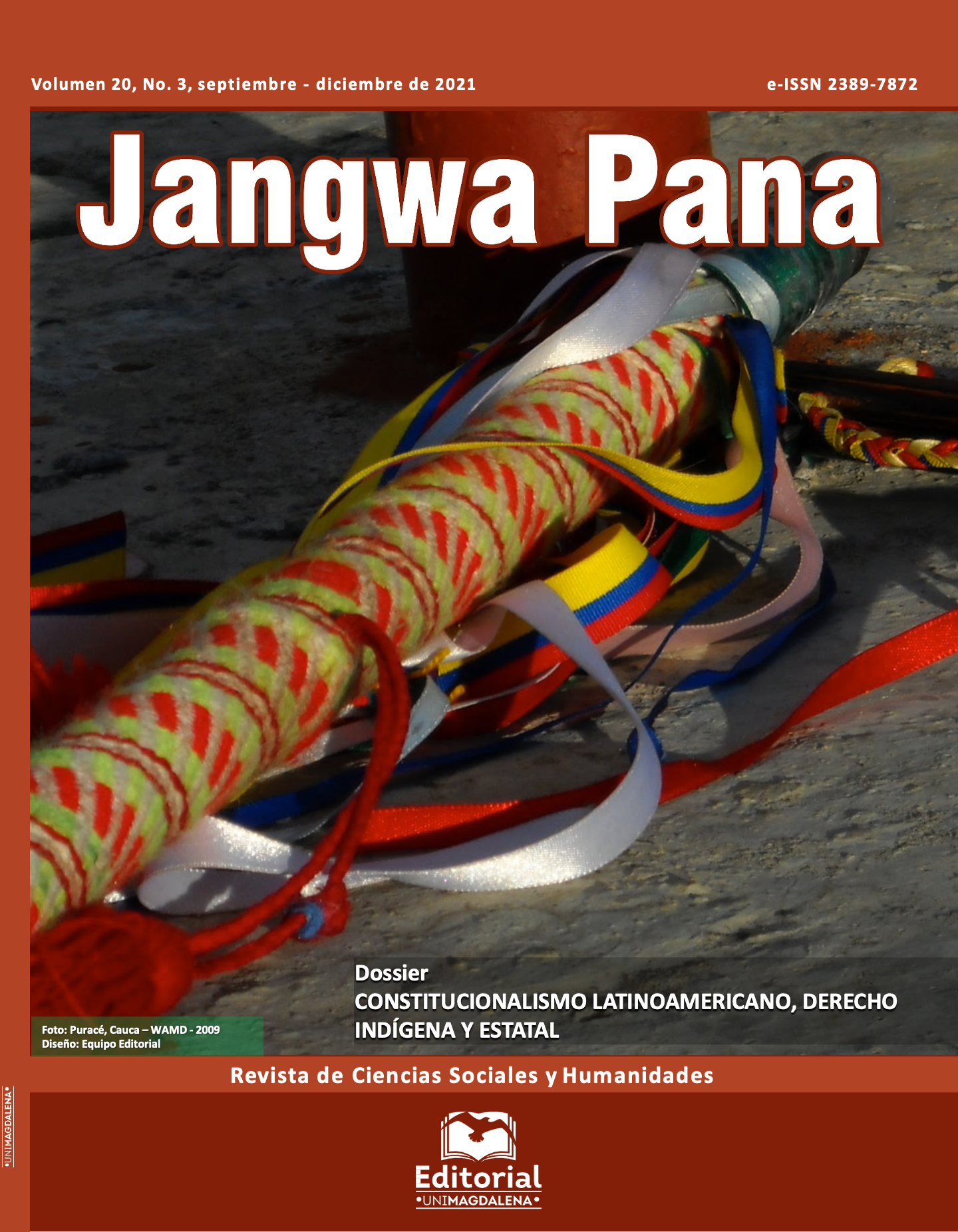Private property and indigenist territory: the individualism-collectivism dichotomy
Main Article Content
Abstract
This article aims to develop a comparative analysis of the private and indigenous property regime in Colombia. To achieve this, antecedents have been established on the rights of indigenous peoples in Colombia and a conceptual framework of indigenous territories and their collective character. A close approximation of the private and indigenous regime is attempted based on the theoretical framework of domain rights derived from the Roman tradition and embraced by the Colombian civil system. It is concluded that there are notable differences between both regimes from the individualism-collectivism dichotomy. Nonetheless, there are also similarities, such as the limits for the exercise of the right. The methodology used was descriptive since this document's general objective is constituted by a phenomenological object (domain right), which it is intended to characterize.
Downloads
Article Details
References
Balbontin-Gallo, C. (2021). El derecho indígena al territorio. Argumentos para una deconstrucción decolonial del Derecho y su reconstrucción intercultural. Utopía Y Praxis Latinoamericana, 26(93), 65-86. Recuperado a partir de https://produccioncientificaluz.org/index.php/utopia/article/view/35587
Congreso de Colombia (04 de marzo de 1991) Ley que aprueba el Convenio 169 de la OIT. [Ley 21 de 1991]
Congreso de Colombia (15 de diciembre de 1961) Ley sobre reforma social agraria. [Ley 135 de 1961]
Congreso de Colombia (19 de julio de 1967) Ley que aprueba el Convenio 107 de la OIT. [Ley 31 de 1967]
Constitución Política de Colombia [Const.] (1991) 2da Ed. Leguis
Corte Constitucional, Sala Septima. (23 DE septiembre del 2011) Sentencia T-693, 2011. [MP Jorge Ignacio Pretelt Chaljub]
Corte Constitucional, Sala Plena (18 de septiembre de 1998) Sentencia SU-510. [MP Eduardo CIFUENTES MUÑOZ]
Corte Interamericana de Derechos Humanos (31 de agosto de 2001) Caso de la comunidad Mayagna (Sumo) Awas Tingni vs. Nicaragua, fondo, reparaciones y costas, serie C, núm. 79.
Corte Interamericana de Derechos Humanos (28 de noviembre de 2007). Caso del pueblo Saramaka. vs. Surinam, excepción preliminar, fondo, reparaciones y costas, sentencia de 28 de noviembre de 2007, serie C, núm. 172.
Figueroa, N., y Jayariyu, G. (2015). Mirada a la cultura wayúu, base de su sistema normativo. Verbum, (9), 109-117. Recuperado en 17 junio de 2019, de:
https://revistas.usergioarboleda.edu.co/index.php/verbum/article/view/204
Hernandez M. (2018). Entrevista con palabrero de la comunidad wayuu. Comunicación personal. (11 de diciembre de 2018).
Iglesias J. (s.f) Derecho Romano. Editorial: Ariel. Barcelona, España
Jaramillo Jaramillo y Rico L. (2001) Derecho civil. Bienes. Derechos reales. Edición: Leyer. Bogotá, Colombia
Martínez de Bringas, Asier. (2009). La deconstrucción del concepto de propiedad: Una aproximación intercultural a los derechos territoriales indígenas. Utopìa y Praxis Latinoamericana, 14(45), 11-29. Recuperado en 30 de septiembre de 2020, de http://ve.scielo.org/scielo.php?script=sci_arttext&pid=S1315-52162009000200003&lng=es&tlng=pt.
Organización Internacional del Trabjo (05 de junio de 1957) Convenio sobre pueblo indígenas y tribales [Convenio 107] https://www.ilo.org/dyn/normlex/es/f?p=NORMLEXPUB:12100:0::NO::P12100_ILO_CODE:C107
Organización Internaciona del Trabjo (27 de junio de 1989) Convenio sobre pueblo indígenas y tribales [Convenio 169] https://www.ilo.org/dyn/normlex/es/f?p=NORMLEXPUB:12100:0::NO::P12100_ILO_CODE:C169
Figueroa, N. (2017). Pilares y valores de la cultura Wayúu. Verbum, (11), 41-52. Recuperado a partir de https://revistas.usergioarboleda.edu.co/index.php/verbum/article/view/635
Polo. F (2018) Sistema Normativo Wayuu Modulo Intercultural. Santa Marta: Universidad Sergio Arboleda. Recuperado de https://repository.usergioarboleda.edu.co/bitstream/handle/11232/1083/Sistema%20normativo%20Way%C3%BAu.pdf?sequence=1&isAllowed=y
Saivigny F. y Thibaut A. (2018) La polémica sobre la codificación. Editorial: Jurídicas Olejnik. Santiago de Chile.
Sánchez Botero, Esther. (2009). La realización del pluralismo jurídico de tipo igualitario en Colombia. Nueva antropología, 22(71), 31-49.
http://www.scielo.org.mx/scielo.php?script=sci_arttext&pid=S0185-06362009000200003&lng=es&tlng=es.
Schulz F. (1970) El derecho romano clásico. Editorial: Bosch. Barcelona, España.
Universidad Nacional (2020) El proyecto de código civil colombiano.
Velásquez L. (2000) Bienes. Ed. Temis: Bogotá, Colombia
Vieco. J, Franky. C, Echeverri.J. (2000) Territorialidad Indígena y Ordenamiento en La Amazonia. Recuperado de 15 de febrero de 2019, de https://repositorio.unal.edu.co/bitstream/handle/unal/19951/9588051851.pdf?sequence=1&isAllowed=y

